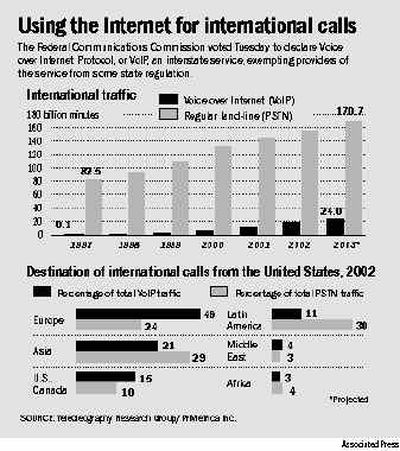FCC rules Internet-based calls not subject to state rules

WASHINGTON — U.S. regulators ruled Tuesday that providers of Internet-based phone call services fall under the jurisdiction of the federal government and cannot be regulated by states.
The Federal Communications Commission voted 5-0 in favor of Vonage Holdings Corp. of Edison, N.J., which had asked the agency to declare the company’s product an interstate service, giving the FCC regulatory control.
Vonage has been battling public utilities officials in Minnesota who want the company to register in the state as a telecommunications service, subjecting it to rate regulation and other state rules.
The ruling applies to cable, phone and other companies offering an Internet phone service similar to the one Vonage provides. The decision does not, however, preclude states from imposing some taxes and fees. It also does not address access charges, which are fees paid to local phone companies for completing calls sent via the Internet to conventional phones.
Vonage also had asked the commission to certify it as an information service, instead of a telecom company. Such a move would have a profound impact on the industry because it would mean providers of Voice over Internet Protocol, known as VoIP, wouldn’t have to pay the taxes and fees that traditional phone companies do. The commission did not rule on that request.
FCC Chairman Michael Powell said streamlining regulation of VoIP companies is key to growth of the fledgling industry.
“To subject a global network to disparate local regulatory treatment by 51 different jurisdictions would be to destroy the very qualities that embody the technological marvel that is the Internet,” Powell said.
There are more than 600,000 subscribers to VoIP services in the United States, up from about 130,000 last year, according to The Yankee Group. The Boston-based communications research firm projects about 1 million subscribers by year’s end.
VoIP technology shifts calls away from wires and switches and instead uses computers to convert sounds into data and transmit them via the Internet.
With a special box, Vonage subscribers can use their conventional phones and existing broadband connection to make calls over the Internet. The company offers unlimited calls in the United States and Canada for $25 a month and has more than 300,000 subscribers.
Vonage argued its service is interstate because it lets customers make calls from any place that has a high-speed Internet connection. That means there’s no way to tell if a customer who has a billing address in Minnesota is making a call from that state or another one, the company said.
In February, the FCC exempted pulver.com’s Free World Dialup from regulation. The service lets consumers make calls to other members without using a regular telephone. Special numbers rather than 10-digit phone numbers route the calls.
A few months later, the FCC ruled that an AT&T service in which some calls were routed over the Internet resembled a traditional telephone service more than a VoIP service and therefore should pay access fees.